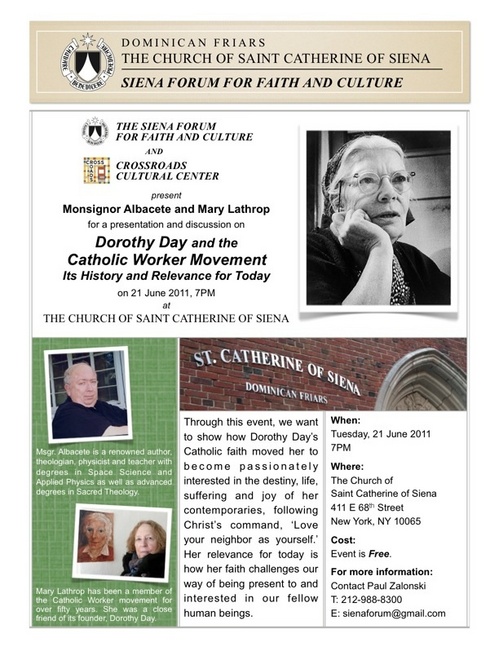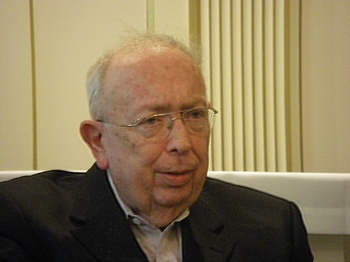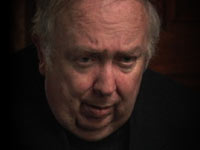 Monsignor Lorenzo Albacete was interviewed by PBS’s Frontline on the 9/11 tragedy.
Monsignor Lorenzo Albacete was interviewed by PBS’s Frontline on the 9/11 tragedy.
Tag: Lorenzo Albacete
Dorothy Day and the Catholic Worker Movement: an American witness to the Culture of Life
Last night at the Church of Saint Catherine of Siena (NYC) a remarkable event took place. About 120 people from all over the Metropolitan New York area attended an event co-sponsored by the Siena Forum for Faith and Culture and Crossroads Cultural Center whereby we wanted to know more about a pivotal figure of the 20th century who was truly human and in love with Christ through the poor, the Servant of God Dorothy Day. Ms. Mary Lathrop, a longtime friend and spiritual daughter of Day’s, with Monsignor Lorenzo Albacete, spoke about the person of Dorothy Day, the Catholic Worker Movement and Catholic Social teaching. Albacete as you know is the well known priest, physicist and theologian who works with the lay movement Communion and Liberation in the USA. Lathrop is a remarkable woman of faith and conviction who gave us a deeper appreciation for the real person that Day was and not the ideaology that is often passed off for the same.
A video of the event is located here.
The following article by Monsignor Lorenzo Albacete was published today on Il Sussidiario (English edition):
This week I was asked to participate in a discussion about Dorothy Day, founder of the “Catholic Worker Movement.” The story of her life captures like none other the history of the Catholic Church in the United States during the last century, and a judgment on her life pretty much indicates how American Catholics look at the challenges and opportunities of the 21st century.
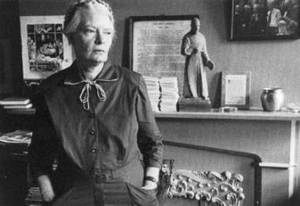 Dorothy Day was born in Brooklyn, NY, on November 8, 1897 and died on November 29, 1980. I must confess that I knew very little about her during the 60’s and 70’s, except that she was a very controversial Catholic pacifist, feminist, and maybe socialist who made many Church authorities very nervous (and still does here and there). I knew about her opposition to the atomic bombing of Hiroshima, but it was not until recently that I read her stunning editorial excerpted below so you can get a feel for her soul’s style:
Dorothy Day was born in Brooklyn, NY, on November 8, 1897 and died on November 29, 1980. I must confess that I knew very little about her during the 60’s and 70’s, except that she was a very controversial Catholic pacifist, feminist, and maybe socialist who made many Church authorities very nervous (and still does here and there). I knew about her opposition to the atomic bombing of Hiroshima, but it was not until recently that I read her stunning editorial excerpted below so you can get a feel for her soul’s style:
Mr. Truman was jubilant. President Truman. True man; what a strange name, come to think of it. We refer to Jesus Christ as true God and true Man. Truman is a true man of his time in that he was jubilant…the newspapers said. Jubilate Deo. We have killed 318,000 Japanese…
Siena Forum to host conversation on Dorothy Day with Lorenzo Albacete and Mary Lathrop on June 21
“Reality holds a signature from God … we must seek to decipher”
In such a case, is awe, wonder, and joy at scientific
discoveries possible? When I was thinking about this, a friend sent me the text
of a speech given by Msgr. Luigi Giussani about the “love of being” that is
remarkably appropriate to this reflection. Giussani’s argument is that the truth of Christianity can be
verified by a proper consideration of the evidence for it. Evidence, he says,
is the correct word, even if the evidence for the Christian claim is given to
us through signs. Signs are things that can be touched, seen, and experienced. The Apostles had Jesus in front of them and this presence was a sign of His
victory over death, and therefore of His mysterious identity. But what about
us? What happens with the passage of time? What signs are there for us as
evidence of the truth of the Christian claim, of the reasonableness of the
Christian claim?
liberty, he says. In this drama, our liberty is a manifestation of our love for
being. Without this love for being we are not truly free and we will never
grasp the evidence of the signs given to us. At this point, as an example of
this love for being, Giussani invokes the Magi.
Continue reading “Reality holds a signature from God … we must seek to decipher”
The New York Encounter: a Different Cultural Event
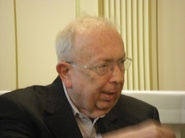 Monsignor Lorenzo Albacete, the ecclesial assistant for Communion and Liberation in the USA, published in the Italy-based online magazine, Il Sussidiario, an appreciative article on this coming weekend’s New York Encounter, a faith and culture festival.
Monsignor Lorenzo Albacete, the ecclesial assistant for Communion and Liberation in the USA, published in the Italy-based online magazine, Il Sussidiario, an appreciative article on this coming weekend’s New York Encounter, a faith and culture festival.
New Republic to the “Meeting for the Friendship Among Peoples” in Rimini,
Italy, the event inspired by the charisma of Msgr. Luigi Giussani, founder of
Communion and Liberation. The New Republic has been and is still the journal of
intelligent liberalism in the United States. As editor, Peter was, in a certain
way, the voice of American progressive thinking. After we returned to the
United States, I asked Peter to write down his impressions of the Meeting so we
could publish it in Traces. He agreed, and wrote a piece in which he concluded
that such an event was not possible in the United States because of the
cultural clashes taking place in our country.
Continue reading The New York Encounter: a Different Cultural Event
Lorenzo Albacete, priest, turns 70
Live the Word of God in Challenging Time: a bible summit
 Exploring the Word of God is an ongoing work for all Christians. Catholics have a good opportunity on June 26 to do some work on last Synod of Bishops on the Word of God. It is a good, necessary and beautiful thing to spend time with God as He’s revealed in sacred Scripture.
Exploring the Word of God is an ongoing work for all Christians. Catholics have a good opportunity on June 26 to do some work on last Synod of Bishops on the Word of God. It is a good, necessary and beautiful thing to spend time with God as He’s revealed in sacred Scripture.
Supreme Court, Faith and Culture
Every time we get a new Supreme Court Justice nominee, I cringe because of the craziness that goes on at the confirmation hearings: it’s not only about philosophical attachments but political mud-raking gets too personal at times. Nonetheless, I’m interested to see how the various ideologies of left and right are daily worked out and the interplay of the culture wars, which haven’t changed all that much over the years: same ideas, different clothing. As always religion plays a role in our life: some commentators are too worried about the religious configuration of the US Supreme Court, and some seem not worried enough. Is there a middle ground? With the US President’s choice of Elena Kagan as a Supreme Court candidate we realize that there’s no Protestant on the bench but there are 6 Catholics of some type and 3 Jews, who also seem not to be too interested in practicing their faith. Exactly, what role does religion play today and are we approaching religion (the practice of faith) on its own terms, or are we reducing it to fit our image and likeness, our own warped standards? Have no fear, Monsignor Lorenzo Albacete helps to define our terms in this week’s Il Sussidiario.
President Obama’s nomination of Elena Kagan to be the next
Supreme Court Justice has opened up a new front in the cultural battle that
characterizes politics in the United States at the present time. Any observer
can write the script of what the response to her nomination will be like. In
fact, on this first day since the nomination the media has already defined the
different ideological positions involved in the struggle, and unless something
entirely unforeseen takes place, nothing new will be said between now and
sometime in July when the Senate votes for or against the nomination.
If the
nomination is approved, it will be the first time that there are no Protestants
in the Supreme Court. There will be six Catholic Judges and three Jewish,
including Kagan. It is difficult to imagine that many of the Catholic Senators
will be influenced in their vote by their Catholic faith, and the Jewish
Senators will almost be sure to insist that their judgment on the nomination
has nothing to do with faith.
But what exactly is the Catholic view on how
faith influences culture? The Christian claim is that faith is a way of knowing
reality. Faith and knowledge of what is real cannot be separated.
This view of
the relation between faith and knowledge has important consequences for our
understanding of the relation between faith and culture, because the culture in
which we live is built precisely on the separation between faith and knowledge
of reality.
In his magnificent book Beyond Consolation, John Waters puts it
this way:
“Our cultures, therefore, no longer affords us a way, in the
conventional public arena in which we spend so much of our time, of seeing
ourselves as we really are. Religion, the means by which we once achieved a
semantic accommodation with total reality, has been discredited by a pincer
movement between the reductions and abuses perpetuated in the name of religion,
and the opposing reaction from outside. One side claims the franchise for
redemption, the other victory over unreason… Stripped of their language of
absolute reality, our cultures begin to squeeze and oppress us in ways we are
incapable even of perceiving. What we have lost has been a loss to ourselves,
to our essential humanity, and yet we have been persuaded to read it as
liberation. We respond to invitations to celebrate our victory over traditions,
as though oblivious that we have half-sawn through the branch we are sitting
on…we have created for ourselves a culture that in many ways denies our
humanity.”
Lorenzo Albacete recounts meeting Luigi Giussani
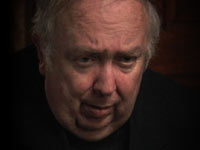 When I first met Msgr. Giussani 16 years ago, I had no
When I first met Msgr. Giussani 16 years ago, I had no
idea what we would talk about. I flew up from Rome to Milan to have lunch with
“Don Gius” and a mutual friend who had arranged the meeting. I thought our
friend would guide the conversation, but the day before the meeting I learned
that he would not be there. It would just be a lunch meeting between Giussani
and myself. On the flight to Milan, I browsed through a book by Giussani that I
had picked up in order to have it autographed (L’Avvenimento Cristiano, The
Christian Event), and because our friend had told me it would help me understand
what Giussani was all about.
interests that we could discuss, I found the following remarks by Fr. Giussani:
“‘The Redeemer of Man, Jesus Christ, is the center of the universe and of
history.’ When I heard John Paul II repeating these words during his first
speech (and the same sentence was literally, my friends can witness to it, the
usual text of our meditation), the emotion I felt reminded me of the
dialectics developed between me and my students at school, and the deep tension
with which we gathered in the name of the Father, the Son, and the Holy
Spirit.” I was amazed because he seemed to be describing the same reaction
I had when, for the first time, I read Pope John Paul II’s first encyclical,
Redemptor Hominis, thirty years ago (March 4, 1979). RH begins with this
affirmation: “The Redeemer of Man, Jesus Christ, is the center of the universe
and of history. To Him go my thoughts and my heart in this solemn moment of the
world that the Church and the whole family in present-day humanity are now
living.”
Lorenzo Albacete to present “God at the Ritz: Attraction to Infinity”
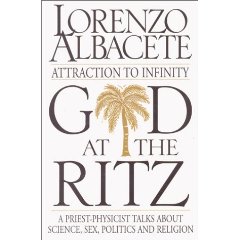 God at the Ritz: Attraction to Infinity: A Priest-Physicist Talks about Science, Sex, Politics and Religion by Lorenzo Albacete
God at the Ritz: Attraction to Infinity: A Priest-Physicist Talks about Science, Sex, Politics and Religion by Lorenzo Albacete
Trained as a physicist and a Roman Catholic priest, Albacete has written a fine book of short reflections on religion, its place in our world, its at-times troubled relationship to its own truth claims, the meaning of suffering, and the experience of pluralism and liberalism. Albacete cites the thought of John Paul II and Cardinal Ratzinger, to be sure, but he also engages with Germaine Greer, Federico Garcia Lorca, and Paul Ricoeur. Albacete’s profound sense of the religious leads him not to dogma but to a series of sensitively framed, sincere questions that should catch the attention and empathy of many readers.
Monsignor Lorenzo Albacete, National Director, Communion and Liberation; Chairman, Board of Advisors, Crossroads Cultural Center; former President, Catholic University of Puerto Rico; former Professor of Theology, St. Joseph’s Seminary, New York.
Wednesday, November 12th, 6:00-7:30pm
Columbia University
Davis Auditorium, Schapiro Center (116th & Broadway)
Read Christopher West’s review of God at the Ritz
